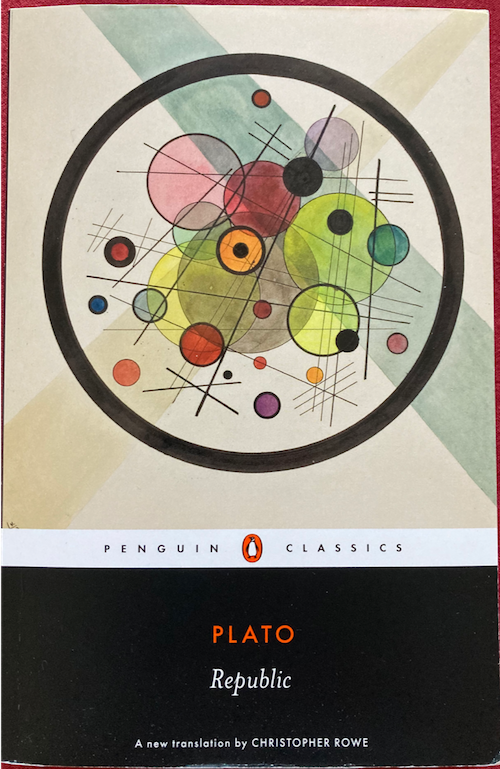|
In writing the Republic, almost 2400 years ago, Plato considers the meaning of justice and whether the just man is happier than the unjust man. In a Socratic dialogue (a sort of old fashioned Q&A) the natures of four unjust constitutions are considered and the debate comes down, in the end, on the side of a utopian aristocratic state ruled by a philosopher-king.
The pros and cons of timocracy, oligarchy, democracy, and tyranny are discussed — all through the form of a dialogue. It is argued that a society will decay and pass through each type of government, ending with rule by tyranny. In an aristocracy the governing class — 'wisdom-loving' aristocrats — are not allowed to own property. In the next level down — a timocracy — the 'spirited' ruling class (who are warriors or generals; an example is Ancient Sparta) are allowed to own property. Thus they start to accumulate and waste money which "begins to be prized over virtue" and the leaders then seek to change the law to support the materialistic lust of the citizens (the freedom to be rich?). And so the descent towards an oligarchy ('desiring') where the governing class starts to change the law to ensure they hold onto political power. Remind you of anywhere? An oligarchy, with the widening gap between rich and poor, culminates in a revolt by the majority, the underclass, who establish a democracy with its focus on maximum freedoms and power being distributed fairly. The democracy is also led by desire (or want), like an oligarchy, but in a more "undisciplined, unrestrained way". And so the populist democratic government will lead to an ochlocracy (or mob rule), fuelled by fear of the oligarchy "which a clever demagogue can exploit, take power and establish tyranny." Remind you of anyone? In a tyrannical system of government, as wikipedia notes, "the city is enslaved to the tyrant, who uses his guards to remove the best social elements and individuals from the city to retain power (since they pose a threat), while leaving the worst. He will also provoke warfare to consolidate his position as leader." Where are we now? Does any of this apply? The nation members of the permanent security council of the UN are a gang of five: China, France, Russia, the UK, the US. The first is an anti-democratic one-party state; the second a semi-presidential republic; the third, Russia, a constitutional republic led by an unscrupulous authoritarian; the fourth is a parliamentary constitutional monarchy ruled (at present) by timocrats (the Tories); the fifth, the U.S. is a federal presidential constitutional republic and looks rather like an oligarchy (greed is good). The end stage of Trump's rule, culminated in riots in the capitol, and looks disturbingly like the tyranny Plato describes. Plato’s argument is that an aristocratic system (with a good-guy philosopher king) will provide the best form of government: one grounded on wisdom, reason, justice, fairness. Of course this system he envisaged relied on slavery existing too (it was written in a time of slavery 375BC). So, perhaps, not so great after all. Would that the UN security council was led by philosopher-kings. Xi, Macron, Putin, Johnson, Biden. Only two of these appear to have the better natures we might long for in our leaders. The concept of a UN permanent security council is a cold war madness we must abandon. Let Gaia, our precious Earth, have a sixth wise-philosopher seat on the council, and give her 51% control of the vote. Information and quotes from Wikipedia Comments are closed.
|
AuthorAlison Hackett — Director and founder of 21st Century Renaissance; author of The Visual Time Traveller 500 Years of History, Art and Science in 100 Unique Designs Archives
February 2023
Categories |
ReviewsThe Visual Time Traveller
This is a labour of love, insanity, beauty and, perhaps, an attempt to reintegrate history, art and science together again. Simon Cocking Irish Tech News Crabbing Her range of language is both staccato and soft, in succinct verse, which encourages you to read this aloud, truly the best way to engage in the emotional depth of a poem. Deirdre Conroy Sunday Independent Poetic Licence in a Time of Corona Your poems tell us all we need to know Ryan Tubridy, RTE Radio podcast |
CONTACTNOT RETAIL
21st Century Renaissance The Glasshouse Harbour Court, George's Place Dun Laoghaire, A96 R8CT Co. Dublin, Ireland E [email protected] VAT number 3761911TH |
© Twenty-First Century Renaissance Ltd 2022 Associate member of Publishing Ireland; Member of Independent Publisher's Guild All rights reserved


 RSS Feed
RSS Feed